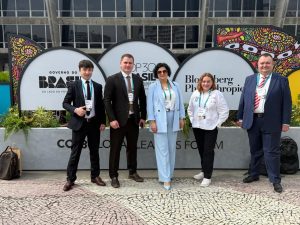Case studies, District heating, Municipal buildings and facilities, Others, RES, Residential buildings, Street lighting, Transport
Eastern Partnership cities join global climate leaders in Rio

With the Global Covenant of Mayors support, signatories from six Eastern Partnership cities joined more than 300 global leaders at the C40 World Mayors Summit and Urban Transition Mission Global Innovation Summit in Rio de Janeiro, Brazil, from 3-7 November 2025.
The CoM East delegation included officials from Sheki (Azerbaijan), Balti and Sireti (Moldova), and Khmelnytskiy, Mykolayiv, Vinnytsia, and Zhytomyr (Ukraine).
From Pledges to Action
Mayors and city leaders focused on moving from promises to delivery. C40 data shows 73% of member cities have already cut their emissions and are now reducing them.
“We return from Rio de Janeiro with inspiration, ideas, contacts, and the desire to implement concrete actions to reduce the impact of climate change,” said Ana Gherciu, Deputy Mayor of Sireti.
The summits called this the “decade of delivery” – turning climate plans into real projects on the ground.
New Support for Cities
C40 launched three new programmes:
- Cool Cities Accelerator to fight extreme heat
- Thriving Food Systems Accelerator to reform urban food systems
- Urban Planning Accelerator (with UN-Habitat) to support sustainable district planning
Cities called for 1.3 trillion USD in funding through the “Baku-to-Belém Roadmap” to get a permanent seat in global climate finance discussions. The Global Methane Hub announced 10 million USD for Latin American and Caribbean cities to cut methane emissions from waste.
Participants noted that by 2050, the world will need more than 90 trillion USD in new infrastructure. Public funds alone are not enough. Cities called for blended-finance platforms and de-risking mechanisms to attract private capital.
More than 21 million green jobs have already been created across 81 C40 cities. Mayors said funds must reach municipalities directly and not get lost in bureaucracy.
How Small Cities Attract Investment
Sayyara Musayeva, Deputy Mayor of Sheki, as the speaker of the panel “Reality Check: Innovation and Investment for Urban Transitions”, told how smaller cities can attract private finance.
“From COP29 in Azerbaijan to COP30’s Local Leaders Summit in Rio — witnessing climate action evolve from global negotiation to local delivery,” Sayyara Musayeva said.
She said the key is to build trust through partnerships with international companies and to align local projects with national priorities. Sheki worked with Signify on a citywide energy-efficient street lighting audit and uses Azerbaijan’s Energy Efficiency Fund to access loans and grants.
“When local ambition meets national frameworks and international cooperation, we transform climate goals into bankable projects,” Musayeva said.
Balti Shares Energy Transition Experience
Stela Pripa, Head of the Economic Development Department of Balti, spoke on a panel on investments in clean, resource-efficient energy systems.
She shared how Balti is building local expertise, training young professionals, working with academia and international partners, and running public awareness campaigns.
“The experience in Rio has shown that real change begins at the local level — where vision and partnerships can transform cities into sustainable communities,” Stela Pripa noted.
She said the city has 18 projects under evaluation – a sign that Balti is becoming a credible partner for international cooperation.
“Collaboration is the new currency — it gives value to every project, every idea, and every community that truly wants to evolve,” Pripa said. “Sustainable development is not only about technology — it’s about trust, collaboration, and shared purpose.”
Ukraine Demonstrates Resilience
Oleksandr Sienkevych, Mayor of Mykolaiv, spoke at a session on “The Built Environment: Generating Resilient Communities”. He said Mykolayiv is building a resilient and sustainable community through strategic planning, technological innovation, and international partnerships.
The city is developing a master plan for future reconstruction that prioritizes sustainability. Mykolaiv is digitising municipal services and creating a digital map of the city infrastructure. Also, the city is working with German organisations on a Water Innovation Lab to develop and commercialise water-related technologies in Mykolaiv. Furthermore, Mykolaiv is building infrastructure resilience in its reconstruction efforts. This includes installing modular boilers and diesel generators to ensure a supply of heat and water during power outages.
The city is creating comfortable recreational spaces, convenient urban infrastructure, and modern schools. The community is involved in deciding on key reconstruction projects, including cultural sites.
“We can demonstrate, like no one else, resilience and resistance to any challenges — war, disasters, or natural calamities. We have learned how to survive and can share this experience with others,” Mayor Sienkevych noted. “By working together and exchanging ideas, we can tackle our shared challenges faster and create a greener, more resilient future for our communities.”
Mykola Vavryshchuk, Deputy Mayor of Khmelnytskyi, presented the municipality’s achievements in its efforts to become a green city. He spoke to representatives of central banking institutions and mayors from more than 20 cities about progress in implementing Khmelnytskyi’s solid waste project, modernising the trolleybus fleet, and developing a city’s sustainable mobility plan. He also highlighted areas for investment.
Study Tour in Rio
The delegation visited Rio’s Operations Center, which responds to emergencies and collects data. They also visited the BRT Centre of Operations to learn about the public transport system.
At a household waste center, they learned how the city manages waste. Most waste still goes to landfills, but Rio de Janeiro composts part of its organic waste.
City-to-City Learning
UTM launched the City2City programme, selecting 28 cities in 11 pairings for twinning and knowledge exchange. A second call for applications is open until 8 January 2026.
Zhytomyr (Ukraine) was paired with Çorlu (Turkey) and Sekondi-Takoradi (Ghana). The programme aims to co-create carbon-neutral, resilient, and people-centred solutions.








